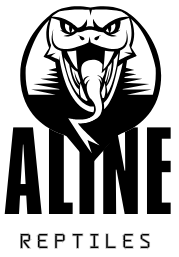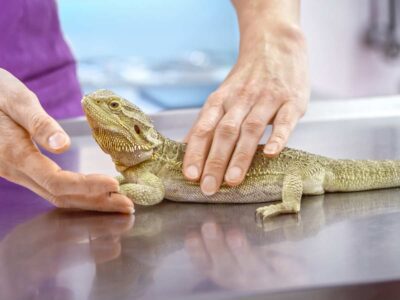Imagine waking up one day to find your usually active and curious bearded dragon acting sluggish, refusing food, and struggling to move its hind legs. As a responsible pet owner, this can be alarming. One of the most common yet serious health issues affecting these beloved reptiles is bearded dragon impaction.
Impaction occurs when the digestive tract becomes blocked, making it difficult or even impossible for waste to pass. If left untreated, impaction can lead to severe health complications and even death. Understanding what causes impaction, how to recognize it, and the best ways to treat and prevent it can make a significant difference in your pet’s health and longevity.
Causes of Impaction in Bearded Dragons
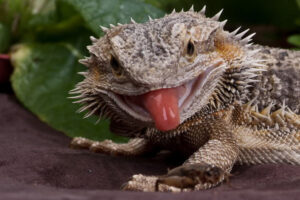
Impaction can occur due to various factors, most of which are preventable with proper care. Below are the primary causes:
1. Dietary Factors
Bearded dragons have specific dietary needs, and improper feeding can lead to impaction.
| Cause | Explanation |
|---|---|
| Oversized Food | Feeding insects or food items that are too large for the dragon to digest. |
| Hard-to-Digest Insects | Mealworms and superworms have tough exoskeletons that can block the digestive tract. |
| Lack of Fiber | A diet lacking in fiber-rich vegetables can slow down digestion. |
| Accidental Ingestion of Substrates | Loose substrate like sand or gravel can be swallowed while eating, leading to blockages. |
2. Environmental Factors
Bearded dragons rely on external heat sources to digest food properly. Poor husbandry can contribute to impaction.
| Cause | Explanation |
| Inadequate Basking Temperature | Low temperatures slow down digestion, increasing the risk of blockages. |
| Low Humidity | Dry conditions can cause dehydration, leading to constipation and impaction. |
| Improper Substrate | Loose bedding, such as calcium sand or wood chips, can be ingested accidentally. |
3. Other Contributing Factors
- Dehydration: Bearded dragons need proper hydration to digest food effectively. Without enough water, stools become hard and difficult to pass.
- Lack of Physical Activity: A sedentary lifestyle can slow digestion and make impaction more likely.
Symptoms of Impaction
Recognizing impaction early can save your bearded dragon’s life. Here are the most common signs:
| Symptom | Description |
| Constipation | Little to no bowel movements over an extended period. |
| Lethargy | Unusual tiredness or lack of energy. |
| Loss of Appetite | Refusing food, even favorite treats. |
| Swollen or Hard Abdomen | The belly may feel firm or bloated. |
| Dragging Hind Legs | Partial paralysis due to pressure on the spine. |
| Struggling to Walk | Difficulty in movement, appearing weak or unstable. |
If your bearded dragon exhibits any of these symptoms, immediate action is necessary.
Diagnosis of Impaction
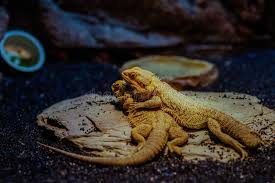
If you suspect impaction, follow these steps:
- Observation: Monitor bowel movements and behavior changes.
- Palpation: Gently feel the abdomen for lumps or hard spots.
- Veterinary Examination:
- A reptile veterinarian can perform X-rays to confirm impaction.
- Blood tests may be required to check for infections or metabolic issues.
Treatment Options for Impaction
Home Remedies for Mild Cases
If your bearded dragon is mildly impacted, try the following:
| Treatment | Method |
| Warm Baths | Soak the bearded dragon in warm water (90-95°F) for 15-20 minutes daily. |
| Abdominal Massage | Gently massage the lower abdomen to encourage movement. |
| Hydration | Offer water through a dropper if necessary. |
| Pumpkin Puree | Small amounts of pure pumpkin can act as a natural laxative. |
| Olive or Coconut Oil | A few drops mixed with food can help ease digestion. |
Veterinary Treatment for Severe Cases
If home remedies do not work, seek veterinary care immediately.
- Laxatives or Enemas: The vet may administer a safe laxative to ease stool passage.
- Surgical Intervention: In extreme cases, surgery may be necessary to remove the blockage.
- Fluid Therapy: If dehydration is severe, the vet may administer fluids intravenously.
Prevention Strategies
1. Proper Diet and Feeding Habits
- Always feed insects no larger than the space between the bearded dragon’s eyes.
- Provide fiber-rich greens such as collard greens, mustard greens, and dandelion leaves.
- Avoid excessive mealworms and superworms due to their tough exoskeletons.
2. Creating a Safe Environment
| Factor | Recommendation |
| Basking Temperature | Maintain a basking spot between 95-110°F. |
| Substrate Choice | Use reptile carpets, tile, or paper towels instead of loose substrates. |
| Humidity Levels | Keep humidity around 30-40% to prevent dehydration. |
3. Encouraging Hydration and Activity
- Mist your bearded dragon occasionally and provide fresh water daily.
- Allow time outside the enclosure for exercise.
- Offer hydration through fresh vegetables.
Frequently Asked Questions
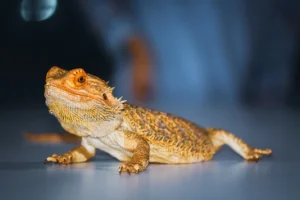
1. How can I differentiate between impaction and brumation?
Brumation is a hibernation-like state where bearded dragons become less active but will still pass small amounts of waste. Impaction, however, causes complete constipation and physical distress.
2. Is loose substrate always bad?
Yes, for young or small bearded dragons, as they are more likely to ingest it. For adults, some bioactive substrates can be safe if managed properly.
3. How often should a bearded dragon poop?
- Baby dragons: 1-3 times per day.
- Juveniles: 3-5 times per week.
- Adults: 1-2 times per week.
If your dragon is going beyond these ranges, monitor for signs of impaction.
4. When should I take my bearded dragon to the vet?
If home treatments do not work within 48 hours or if your dragon shows signs of severe distress, seek veterinary help immediately.
Conclusion
Bearded dragon impaction is a serious but preventable condition. By maintaining a proper diet, ensuring an optimal environment, and monitoring your pet’s health, you can reduce the risk of impaction and keep your bearded dragon thriving. Early detection is crucial—if you notice any symptoms, act quickly to prevent complications. Responsible care ensures that your pet remains healthy, active, and free from impaction-related issues for years to come.
